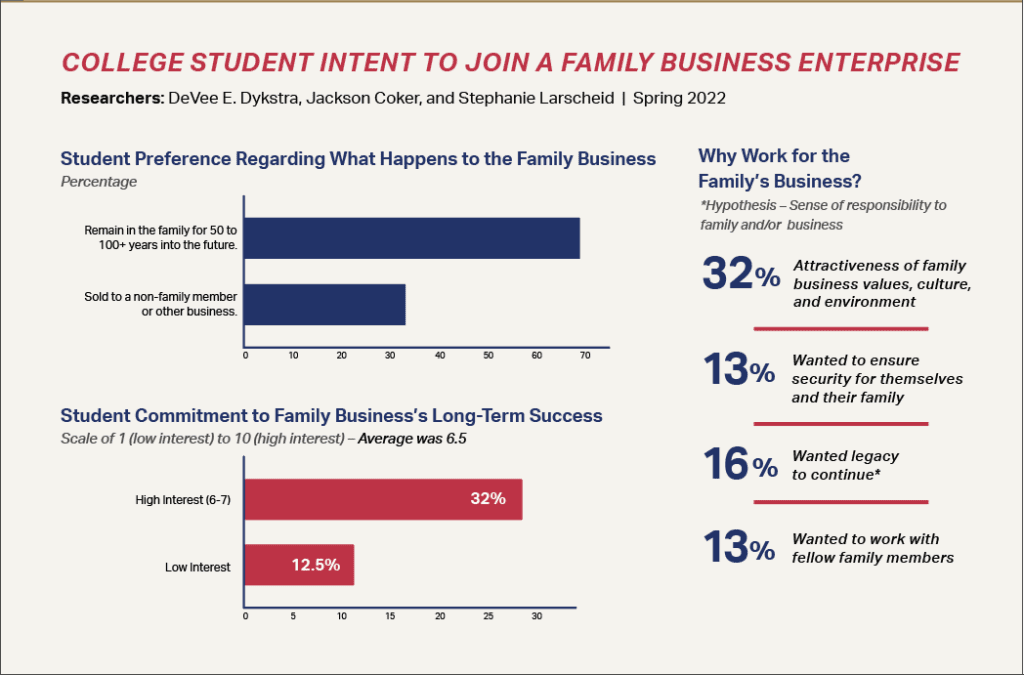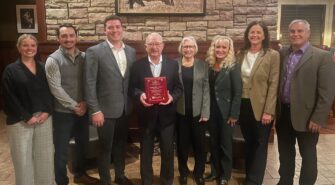Multigenerational ranch, lodge to host family business retreat
Recent News
New research offers family business insight across generations
Posted in PFBA, Sponsor Insights | May 25, 2022
How do hundreds of USD students feel about joining a family business?
De Vee Dkystra asked them.
“Not very much research has been done on this topic, and we wanted to know how college-age students feel about joining either their family business, if they have one, or any family business,” said Dkystra, professor of business law and ethics at the USD Beacom School of Business.

“Family businesses are so key to the region’s economy, and given the current labor shortage, we wanted to know how students perceived the opportunities at family businesses.”
More than 300 students responded, and nearly four in 10 were part of a family business.
Here are a few key findings:
- On a scale of one to 10, with one being low interest and 10 being high, students were asked to rate their commitment to family businesses’ long-term success. The average score was 6.5, with nearly one-third saying they had high interest of at least a six, and 12.5 percent saying they had low interest.
- Of students who were part of a family business, nearly 70 percent wanted it to remain in the family for at least another 50 years, while just over 30 percent wanted it sold to a nonfamily member or other business.
- And when considering why to work for a family business, 32 percent cited the attractiveness of family business values, culture and environment.

“A lot of students who showed high interest in the long-term success of the family business had excellent family and working relationships and personal relationships within the family,” Dykstra said. “But we also found encouragement played a role in a student’s desire to join the family business. Only about one-third had been encouraged to join the business, and they had a higher likelihood of wanting to join.”
Some reasons students were reluctant to join included “not wanting to ruin a positive family relationship or fearing that they couldn’t meet expectations,” Dykstra said. “And sometimes it just wasn’t a career fit. The family might have a farm or restaurant and the student might be interested in the health care field, for instance.”
Among students who weren’t directly part of a family business, some interesting perceptions emerged, she added.
“They had worries about the viability of a family business, family drama and often misperceptions about the opportunities available,” she said. “There’s a perception that family businesses are small and don’t offer as many opportunities, when in fact a lot of them are very large with many openings and occupations.”
The research showed there’s education and more work to be done, she added.
“I think there’s more research to be done but also an opportunity for higher education to open students’ eyes to what family businesses are. They’re not synonymous with small business, and there are lot of opportunities whether a student has a family business or not.”
That’s consistent with findings from an annual survey of family businesses by advocacy group Family Enterprise USA.

“In our most recent survey, 51 percent of businesses that responded have been in business over 50 years, and 75 percent have been in business over 30 years, so the longevity is there,” president Pat Soldano said.
“The other statistic students and all employees should know is that family businesses tend to pay better in terms of salary and benefits. Forty-six percent of those we surveyed pay above average, and last year it was 52 percent, so they treat employees better, keep them even during very difficult economic times and plan for the long term. They plan their businesses as a legacy.”
Family Enterprise USA is a new partner of the Prairie Family Business Association, which is a key outreach center of the USD Beacom School of Business.
“One of our priorities is connecting with family business centers, and Prairie Family is one of the biggest and best there is,” Soldano said. “It’s a very well-run organization. We really respect them and chose to sponsor them because they’re one of the best out there and have great membership. We attend their events and support their work, and they support our work.”
Research from Family Enterprise USA, which included responses from Prairie Family Business Association members, found family businesses contribute more than $7.7 trillion to GDP and 83 million private sector jobs. Fifty-four percent added jobs in 2021.
They’re also far from all mom-and-pop shops. Of the 32 million U.S. family businesses, 47 percent have annual sales of more than $20 million, and 35 percent operate in 11 or more states. More than half of all family businesses employ more than 100 people.
As for industries, the survey found 24 percent are in manufacturing, 10 percent are in construction or facilities and 10 percent are in real estate. Only five percent represent agriculture.
The top risks they see post-pandemic are a coming market turndown, availability of labor, government regulation and inflation.
“They’re all struggling with recruiting talent,” Soldano said. “And they’ve had to not only pay up to get people to come on board but raise pay for existing employees to match. But, generally, I think family businesses can navigate these challenges better because they’re more flexible and have more direct control.”
Family businesses also give locally, which is another reason for employees to consider becoming part of them, she added.
“The younger generations are philanthropic and want impact investing and want to make a difference, and family businesses have values that match that,” she said. “More than 75 percent of the giving family businesses do is local.”
Taken collectively, the research shows the key role family businesses play and the opportunities for a new generation of workers to embrace it, said Stephanie Larscheid, executive director of the Prairie Family Business Association.
“It’s important to base decision-making around solid data, and we’re fortunate to have relationships both locally through USD and now nationally through Family Enterprise USA,” she said. “We encourage family businesses to connect with us and learn more about how this research can help them in their recruitment and operations.”
For a full look at the Family Enterprise USA research, click here.




